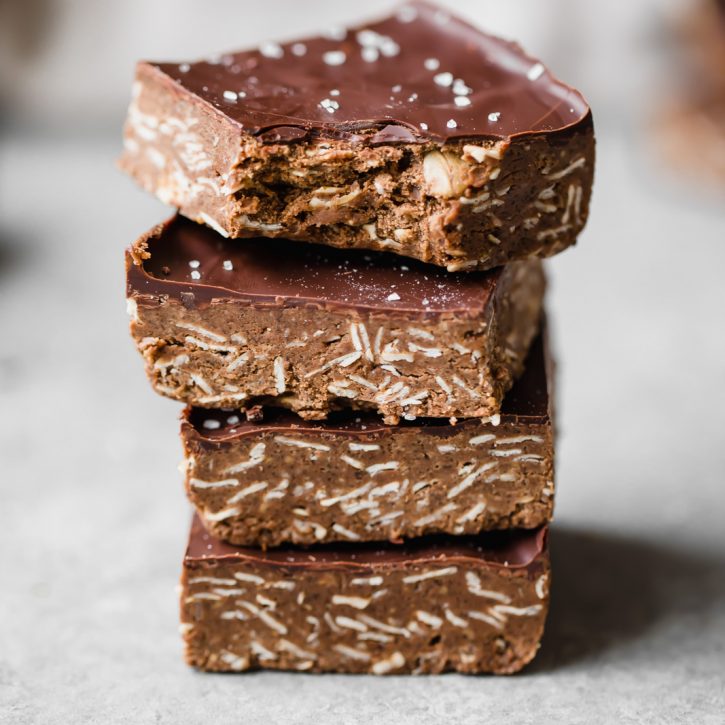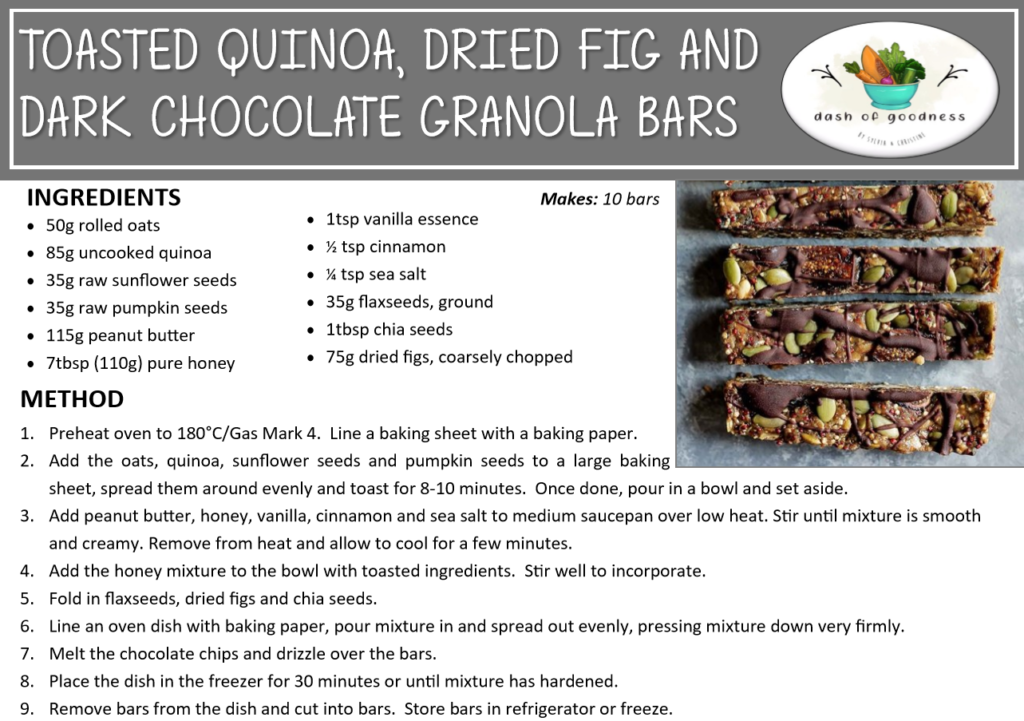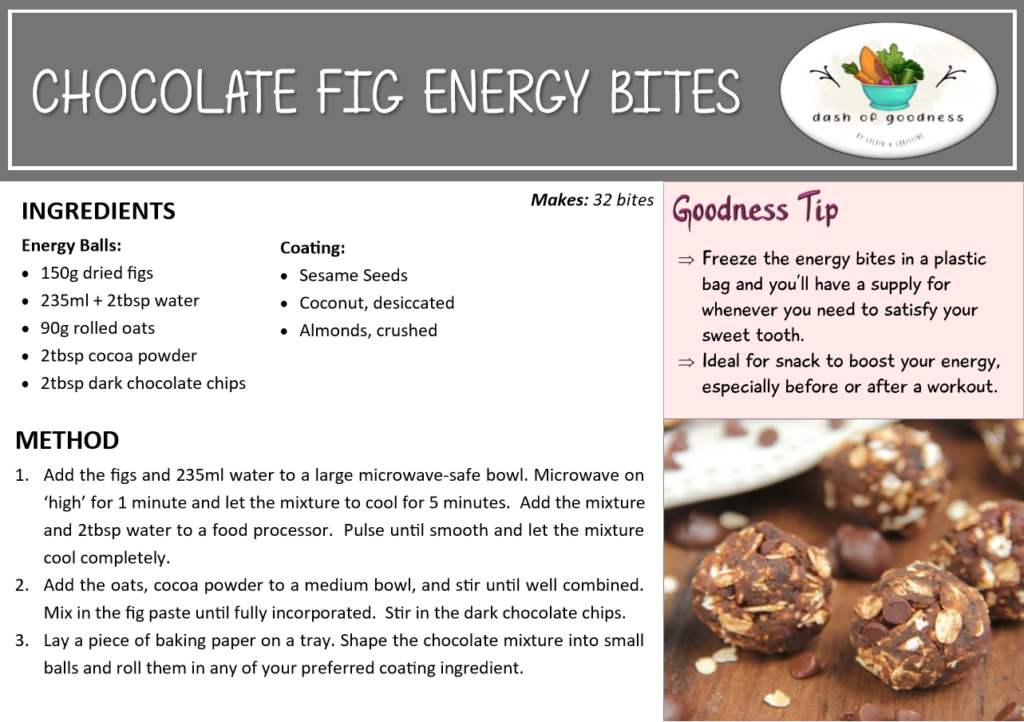
Grab that Protein Bar!
Your Best Performance Won’t Happen On an Empty Stomach!
Training on an empty tank is just as bad as eating bulky food close to a training session! It’s best to eat a quick snack about 30 minutes before you hit the track. The most ideal pre-training snack for athletes should provide sufficient and simple carbohydrates (such as sugars- as these are easily digested), some protein, and fat. It’s very likely that the first thing that comes in handy for an athlete is a protein bar…or even more likely, a store-bought protein bar. Let’s face it, there is a wide variety of protein bars available on the market, most of which make it very tempting for us to give them a try; they are easy to carry, some taste good (I can’t blame you for thinking so if you’ve never tried one made from scratch!), they require no preparation and will fuel your body until your next meal! Their convenience is undebatable… but have you ever thought of what ingredients are used in those tiny little bars?
A study carried out by safefood.eu in 2019 revealed that 1 in 4 ready-made protein bars have chocolate as their main ingredient and nearly 80% of the same foods being surveyed are high in saturated fats and contain sugars and salt. And what about the calorific value of each bar? Have you ever noticed that one bar contains nearly 500 calories which is equivalent to 1/3 of the total energy required daily by an individual? Like with all manufactured foods, analysing the food label- particularly the ingredients list- of a protein bar, is crucial!
Ingredients List
This is the most important part of the label which gives valuable information about any product. Ingredients are listed in order of predominance, with the first one on the list being the used in the greatest amount. Unfortunately, there are many ingredients and additives that turn processed food into a poorer form. Although most of them are considered as safe, for many people the chemical accumulation can cause illness or otherwise deplete their health! The following are some of the most common ingredients found in manufactured protein-bars. In fact, it is advisable to avoid the bar completely if any of the below feature on a label…
Sugar alcohols (e.g. xylitol, sorbitol, mannitol). These are used to sweeten food while keeping calorie levels down. The safety of each type of sweetener depends on the level of absorption and excretion. For instance, erythritol is a bit safer than sorbitol, mannitol and lactitol since it is mostly absorbed into the bloodstream and excreted unchanged in urine. However, individual sensitivities to these sweeteners may vary. Some of them tend to attract water in the colon (leading to laxation) or end up being digested by bacteria (causing gas).
Soy: Soy products are frequently used in protein bars. They are likely to contain genetically modified organisms, unless they are organic.
High-Fructose Corn Syrup (HFCS): Being a type of sugar, HFCS should be kept to a minimum. High-Fructose Corn Syrup increases triglyceride (fat) levels in the blood, thereby increasing the risk of heart disease. When 25% of daily calories are derived from HFCS and fructose, there is a higher risk of visceral or liver fat. Specifically, large amounts of fructose from HFCS or sugar consumed regularly may potentially interfere with hormone levels: insulin, leptin and ghrelin. The latter regulates appetite ad fails to signal the brain when the body is full therefore potentially leading to overeating and weight gain.
Artificial and Natural Flavouring: The use of ‘natural flavouring’ is definitely an effective marketing strategy used to attract more consumers. Although the flavour is derived from a natural source, it doesn’t mean it lacks processing in a lab. Also, it doesn’t provide any additional health benefits. Various chemicals are then used to resemble natural flavours (artificial/synthetic). They are often used instead of the real food (often fruit). Disappointingly, some companies still keep the inclusion of such ingredients top secret, which is unfortunate as some people may be sensitive to certain ingredients.
Carrageenan: This seaweed-derived additive is likely to cause cancer and increase the potency of chemicals that cause cancer if consumed in high doses. Studies indicate that it may cause intestinal irritation too.
Are All Ready-Made Protein Bars of Poor Quality?
The answer is simple: No! Now that you are aware of the ingredients which you should avoid, try to opt for something which is on the healthier side and uses natural sugars (e.g. agave syrup), with fruit, nuts, seeds, coconuts, raw cocoa and other raw ingredients.
The Bottom line…
- If you are still tempted to eat a commercially-available protein bar, make sure this is included in your diet sparingly and that it does not replace your main meal.
- Stick to natural sources of protein in your diet as a healthier alternative to these store-bought bars: nuts, fruit, cheese, hard-boiled eggs, vegetable sticks with homemade hummus, rice cakes with 100% peanut butter (look for a genuine brand or simply blend your favourite nut in a food mixer until a ‘buttery’ texture is obtained).
- With the busy lives we are leading, it’s difficult not to make use of some sort of processed foods. But do your best to rely on whole foods whenever possible, get out of your comfort zone and start experimenting with easy recipes (which often consist of a limited list of ingredients 😉 ), and finally, if manufactured foods cannot be avoided, choose ones with the shortest list of ingredients and avoid highly processed ones (the closest to the natural version, the better).
And what about making your own protein bars from scratch? Have you ever considered stocking your freezer with homemade genuine treats to snack on along the day?
The below recipes are two simple recipes which can be prepared in a few minutes and can be frozen for a couple of months. Store well in an airtight container and simply take out a portion a day before (or a few hours before, depending on the weather) consumption. Enjoy!

